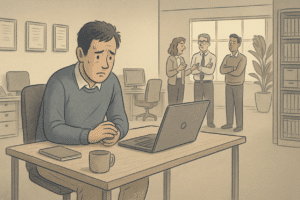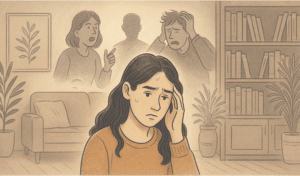Key Takeaways
- Recognizing when your spouse is triggering anxiety attacks is the first step to addressing relationship-based anxiety
- Common triggers in relationships include criticism, unpredictable behavior, and control issues that can lead to serious physical and emotional symptoms
- Effective communication strategies and setting boundaries are essential tools for managing husband-triggered anxiety
- Professional help through individual therapy, couples counseling, or comprehensive treatment programs can provide lasting solutions for relationship anxiety
- A Mission for Michael provides comprehensive anxiety treatment programs that address relationship-triggered anxiety through evidence-based therapies, personalized treatment plans, and both individual and couples counseling approaches.
Husband-Triggered Anxiety
Husband-triggered anxiety occurs when interactions with your spouse consistently activate your body’s stress response system. This isn’t about normal disagreements that all couples experience. Rather, it involves a pattern where certain behaviors, communication styles, or situations involving your husband regularly trigger anxiety symptoms ranging from mild worry to full-blown panic attacks.
While anyone can experience relationship anxiety, women are statistically more likely to develop anxiety disorders and report relationship-triggered anxiety symptoms. This may stem from societal expectations, power dynamics in relationships, or different communication styles. The important thing to understand is that your anxiety isn’t a character flaw; it’s often a normal response to difficult marital patterns that need addressing.
| A Mission For Michael: Expert Mental Health Care Founded in 2010, A Mission For Michael (AMFM) offers specialized mental health care across Southern California, Washington, and Virginia. Our accredited facilities provide residential and outpatient programs, utilizing evidence-based therapies such as CBT, DBT, and EMDR. Our dedicated team of licensed professionals ensures every client receives the best care possible, supported by accreditations from The Joint Commission and the California Department of Health Care Services. We are committed to safety and personalized treatment plans. Start your recovery journey with AMFM today! |
Common Relationship Anxiety Triggers
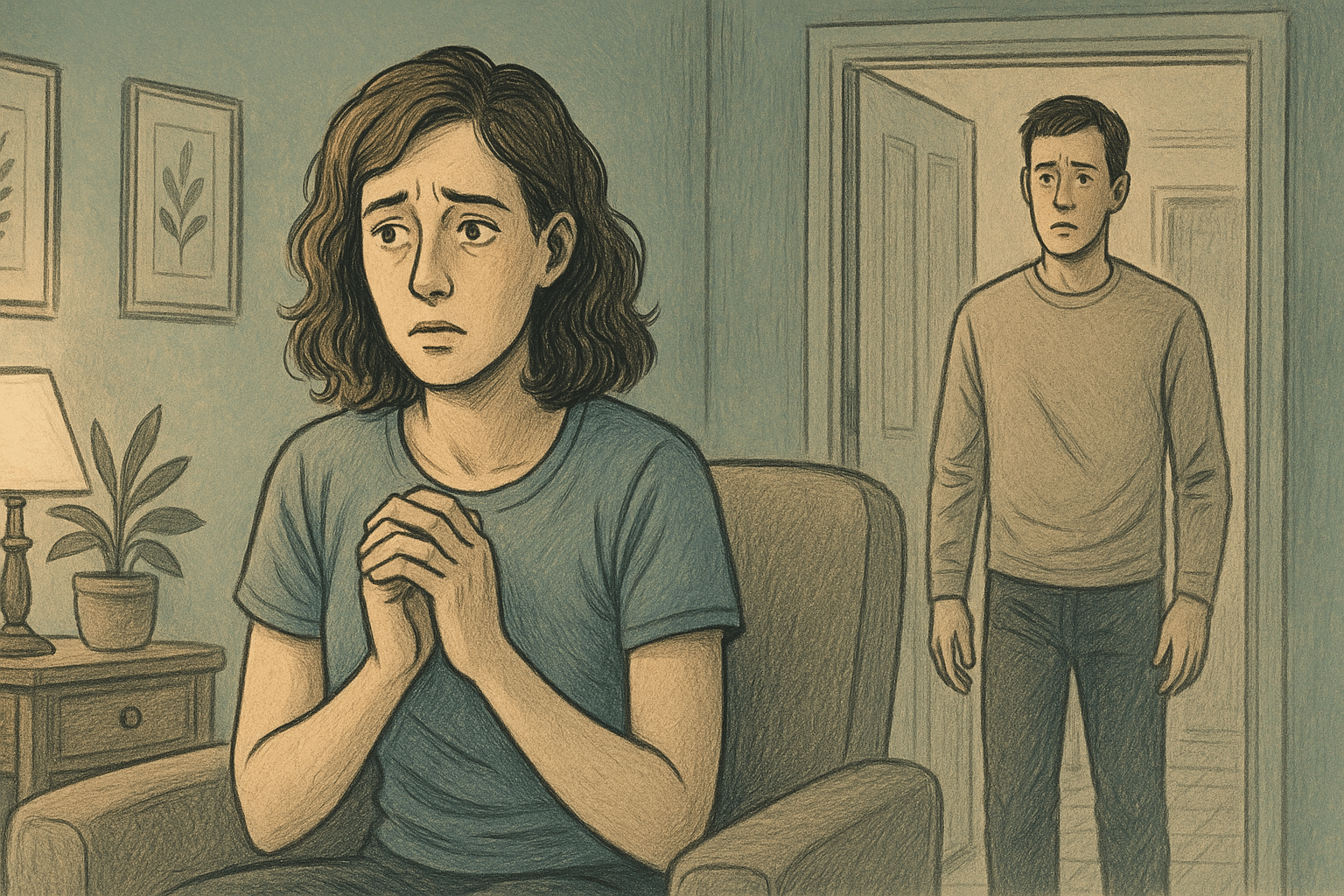
Identifying exactly what triggers your anxiety in your relationship is essential for addressing the root causes.
Criticism and Blame
Constant criticism creates an environment where you feel perpetually judged and inadequate. When your husband frequently points out your flaws, questions your decisions, or dismisses your feelings, you may begin to anticipate criticism in every interaction.
This hypervigilance, or constantly being on guard for the next critical comment, keeps your nervous system in a state of high alert. Over time, this can trigger anxiety attacks as your body remains in fight-or-flight mode.
Unpredictable Behavior
When your husband’s mood or behavior changes dramatically without warning, it creates a sense of walking on eggshells. You might never know if you’ll be met with affection or anger, interest or indifference. This unpredictability makes it impossible to feel emotionally safe, as your nervous system remains constantly vigilant, trying to detect and prepare for potential threats.
This constant stress can eventually manifest as panic attacks, especially when you’re faced with interactions where you can’t predict the outcome.
Control Issues
Control issues in relationships often manifest as excessive monitoring, decision-making without consultation, or restricting your independence. When your husband needs to control aspects of your life, from finances to friendships, social activities to personal choices, it can trigger profound anxiety. This controlling behavior sends the message that you aren’t trusted or capable, gradually eroding your confidence and amplifying anxiety.
Mental Health Impact Of Relationship Anxiety
Depression Risk
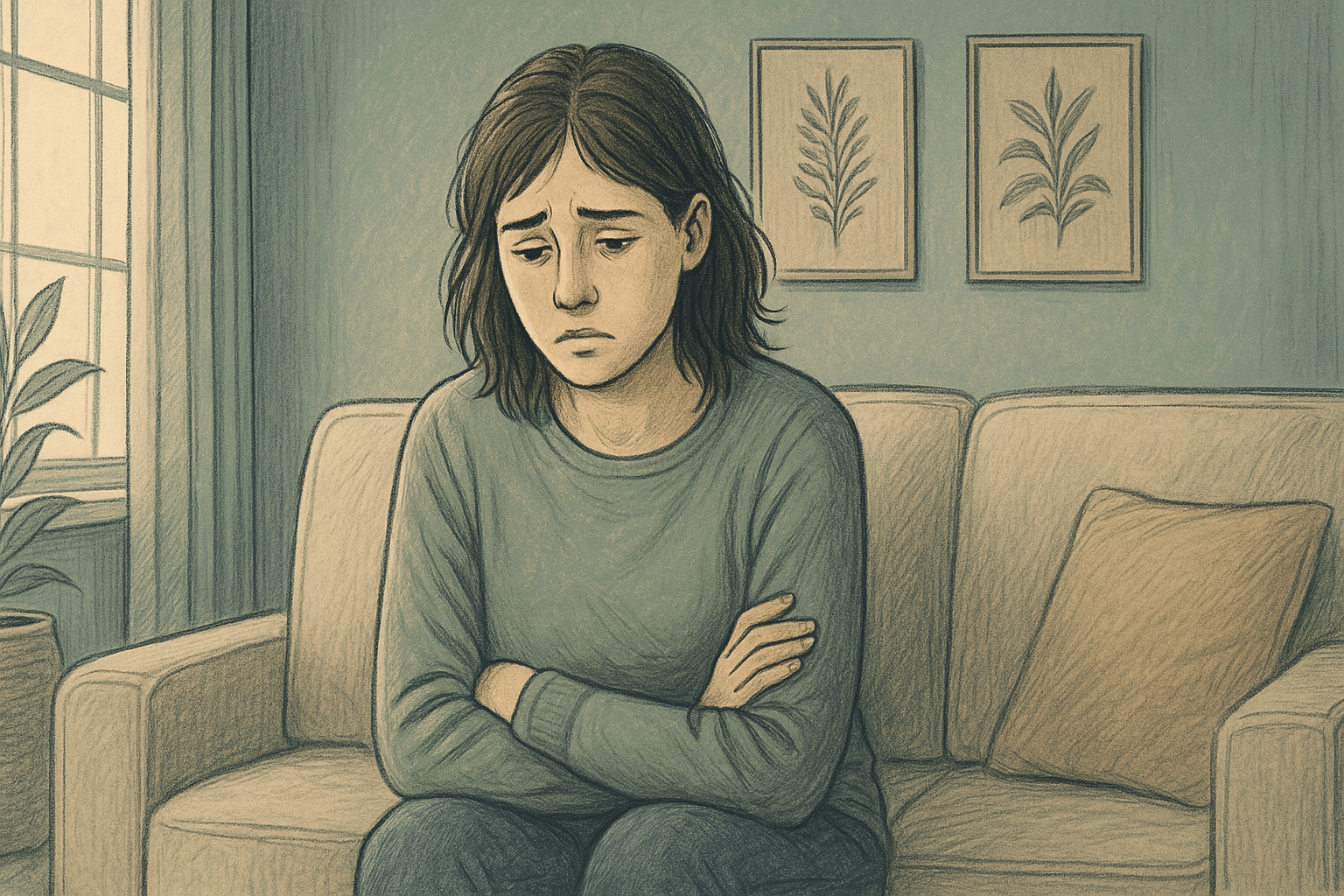
Chronic anxiety in your relationship significantly increases your risk of developing depression.
The persistent stress, feelings of helplessness, and emotional drain from managing a triggering relationship create neurochemical changes that can lead to depressive symptoms.
You might notice decreased interest in activities you once enjoyed, persistent sadness or emptiness, changes in appetite or sleep, difficulty concentrating, or thoughts of death or suicide. These symptoms require immediate attention, as the combination of anxiety and depression can be particularly debilitating and may require professional intervention.
Identity Erosion
Prolonged relationship anxiety can gradually erode your sense of self and personal identity. When you’re constantly walking on eggshells or modifying your behavior to avoid triggering your husband’s reactions, you begin to lose touch with your authentic self.
You may find yourself questioning your own perceptions, memories, and feelings, a process that undermines your confidence in your own judgment. This identity erosion creates a profound sense of emptiness and confusion about who you really are outside of the relationship, making it increasingly difficult to recognize your own needs and desires.
Social Isolation
Relationship anxiety often leads to progressive social isolation as you withdraw from friends, family, and social activities. You might feel too embarrassed to share your struggles, worry about your husband’s reaction to your social connections, or simply lack the emotional energy to maintain relationships outside your marriage.
The constant mental preoccupation with relationship issues leaves little capacity for nurturing other connections, and you may find yourself making excuses to avoid social gatherings or gradually losing touch with your support network. This isolation compounds the mental health impact by removing crucial sources of perspective, validation, and emotional support that could help you recognize unhealthy patterns and maintain your psychological well-being.
Treatment Options for Relationship induced Anxiety
Individual Therapy
Individual therapy provides a safe space to explore your anxiety triggers and develop personalized coping strategies. Working one-on-one with a qualified therapist allows you to process your emotions, identify unhealthy relationship patterns, and build resilience without your partner’s presence potentially influencing the session flow.
Couples Counseling
Couples counseling creates a structured environment where both partners can gain insight into marital issues that contribute to anxiety. A skilled couples therapist acts as a neutral third party, helping identify problematic patterns, improve communication, and develop healthier interaction styles. This approach can be particularly effective when your husband is unaware of how his behavior triggers your anxiety or when both partners are committed to creating change.
Medication Considerations
For some individuals experiencing severe anxiety symptoms, medication may provide needed relief while working through underlying relationship issues. Antidepressants, anti-anxiety medications, or beta-blockers can help manage physical symptoms and create emotional space to engage in therapeutic work. A psychiatrist or primary care physician can help determine if medication might be beneficial in your specific situation and which options would best address your symptoms.
Medication works best when combined with therapy rather than used as a standalone treatment. While medications can provide symptom relief, they don’t address the relationship issue triggering your anxiety. Think of medication as a tool that may help create enough stability to engage in the deeper work of relationship healing or decision-making about your marriage’s future.
When to Consider Separation
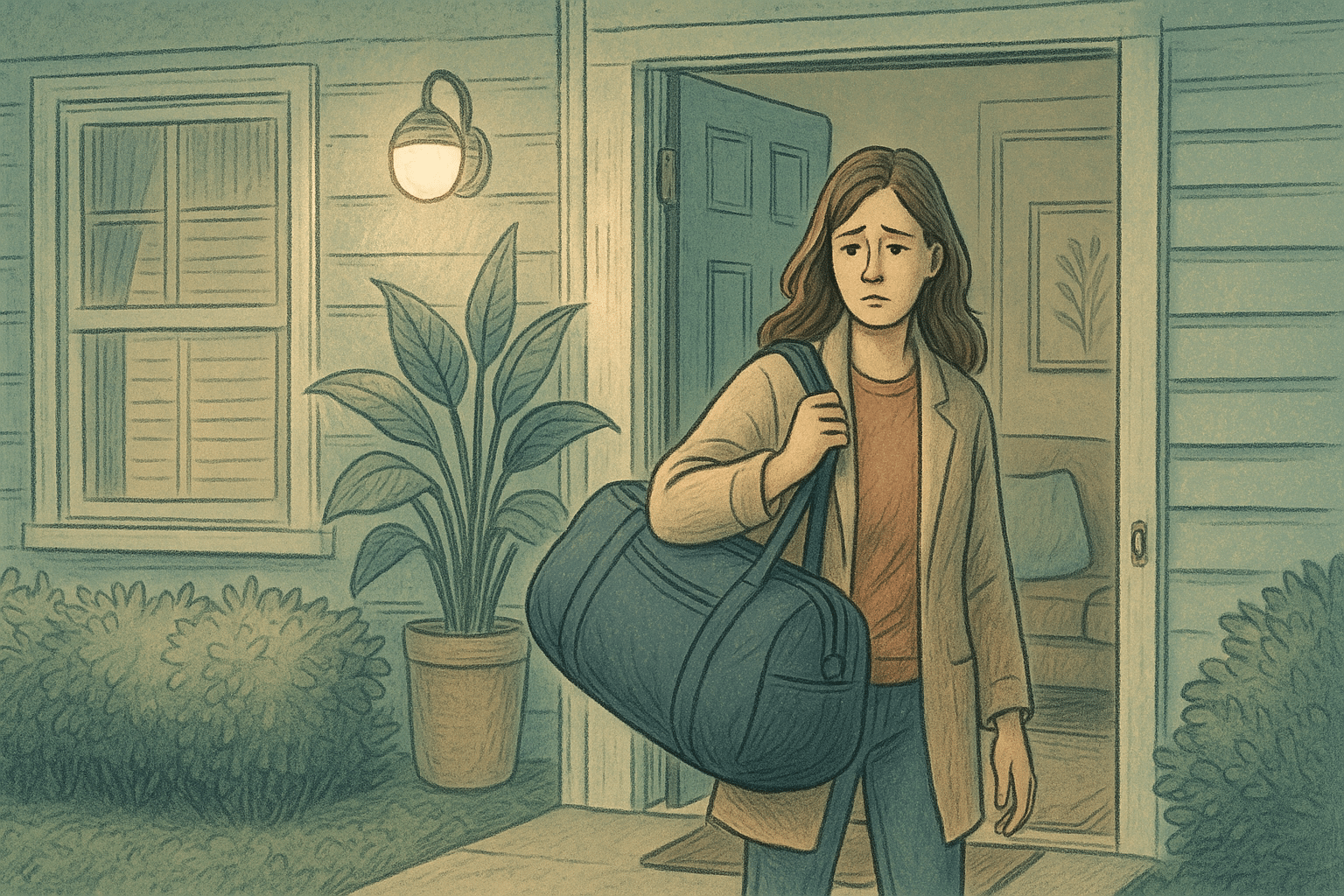
Sometimes, creating physical distance from a triggering relationship becomes necessary for your mental health and wellbeing.
Abuse Warning Signs
If your husband’s behavior crosses the line into abuse, protecting yourself becomes the immediate priority. Emotional abuse (constant criticism, humiliation, controlling behavior), physical intimidation or violence, sexual coercion, financial control, or isolation from friends and family are serious warning signs that require immediate attention.
These behaviors aren’t simply anxiety-triggering, they’re dangerous patterns that typically escalate over time. If you recognize these warning signs in your relationship, reaching out to domestic violence resources can provide crucial guidance for your safety and wellbeing.
Safety Planning
Creating a safety plan is essential if you’re considering leaving a relationship that has abusive elements or if you’re experiencing severe anxiety symptoms. This plan might include identifying safe places to go, saving money in a private account, gathering important documents, establishing a support network, and outlining specific steps to take during crisis moments.
Many domestic violence organizations offer free assistance with safety planning, regardless of whether physical abuse is present. Emotional and psychological abuse can be just as damaging as physical violence and warrants the same careful planning for your protection.
Comprehensive Anxiety Treatment Solutions at AMFM

At A Mission for Michael, we understand the complex interplay between relationship issues and anxiety symptoms. Our comprehensive treatment programs address both the immediate anxiety symptoms you’re experiencing and the underlying relationship factors contributing to your distress.
Through evidence-based individual therapy, specialized couples counseling when appropriate, and personalized treatment plans, AMFM helps you develop the tools needed to manage anxiety while creating healthier relationship boundaries.
Our experienced clinical teams across California, Virginia, and Washington recognize that relationship-triggered anxiety requires specialized care that considers both individual healing and relationship patterns.
If you need intensive support to manage severe anxiety symptoms or outpatient therapy to develop communication skills and boundaries, we provide the comprehensive, compassionate care necessary to help you move from anxiety to emotional stability and renewed confidence in your relationships.
Frequently Asked Questions
Is it normal for my husband to cause anxiety?
While occasional tension in relationships is normal, consistently experiencing anxiety or panic symptoms in response to your husband’s behavior is not healthy or typical. Relationships should generally provide more security and comfort than stress. If interactions with your husband regularly trigger anxiety symptoms, this indicates a problematic relationship that deserves attention.
Can relationship anxiety be fixed?
Relationship-triggered anxiety can improve substantially with appropriate intervention, especially when both partners are committed to change. The healing process typically involves identifying specific triggers, improving communication patterns, establishing healthy boundaries, and sometimes working through individual issues that contribute to relationship flow.
How do I know if it’s anxiety or incompatibility?
Consider if your anxiety stems from specific problematic behaviors that could potentially change, or from fundamental differences in values, goals, or communication styles that constitute true incompatibility. Healthy relationships may trigger occasional anxiety during conflicts or transitions, but they also provide a baseline of security, respect, and positive connection that outweighs these difficult moments.
Can anxiety ruin a good marriage?
Untreated anxiety can strain even strong relationships, particularly when the anxiety stems from marital patterns themselves. However, with awareness, communication, and appropriate support, many couples successfully manage anxiety challenges together. The key distinction lies in whether both partners approach anxiety as a shared challenge to address collaboratively, rather than as one person’s problem or a source of blame and resentment.
How does AMFM approach treatment for relationship-triggered anxiety?
AMFM provides comprehensive anxiety treatment that addresses both individual anxiety symptoms and underlying relationship patterns. Our approach includes specialized individual therapy to help you understand your triggers and develop coping strategies, couples counseling when appropriate, medication management if needed, and trauma-informed care for those with abuse histories.
With locations in California, Washington, and Virginia, we offer both inpatient and outpatient programs customized to your specific needs and circumstances.


